“I have taught men to observe.”
His greatest work, Louis Agassiz believed, was observation.
If observation is essence of science, Agassiz is observation’s gold standard.
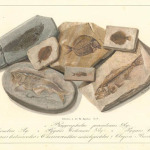 A scholar, earning both M.D. and Ph.D. in his home country of Switzerland, Agassiz (AUG-a-see) accepted a professorship at Harvard University later founding Harvard’s Museum of Comparative Zoology. Engaged across multiple disciplines within natural history, Agassiz researched across Europe, North America, with expeditions to such places as the Amazon River. Books and papers followed his expeditions. His five volume pictorial fish fossil encyclopedia became a standard work establishing Agassiz’s worldwide fame.
A scholar, earning both M.D. and Ph.D. in his home country of Switzerland, Agassiz (AUG-a-see) accepted a professorship at Harvard University later founding Harvard’s Museum of Comparative Zoology. Engaged across multiple disciplines within natural history, Agassiz researched across Europe, North America, with expeditions to such places as the Amazon River. Books and papers followed his expeditions. His five volume pictorial fish fossil encyclopedia became a standard work establishing Agassiz’s worldwide fame.
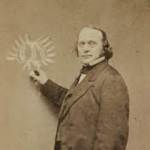 Henry Wadsworth Longfellow’s poem “On the Fiftieth Birthday of Agassiz” tells of the Swiss scientist’s God-given bent toward studying creation’s “storybook, the rhymes of the universe” reading “what is still unread in the manuscripts of God.” Agassiz’ innovative thought broke new ground in the study of geology, zoology, biology, and specifically, ichthyology. The Harvard professor taught well known future scientific creators, discoverers, and seekers. Perhaps Agassiz’s instructional methods are best remembered from his students and the famous essay “Look at your fish!” Reproduced in various forms, the anecdote/recollection/parable is perhaps the best example of observational analysis, comparison study, or inductive reasoning.
Henry Wadsworth Longfellow’s poem “On the Fiftieth Birthday of Agassiz” tells of the Swiss scientist’s God-given bent toward studying creation’s “storybook, the rhymes of the universe” reading “what is still unread in the manuscripts of God.” Agassiz’ innovative thought broke new ground in the study of geology, zoology, biology, and specifically, ichthyology. The Harvard professor taught well known future scientific creators, discoverers, and seekers. Perhaps Agassiz’s instructional methods are best remembered from his students and the famous essay “Look at your fish!” Reproduced in various forms, the anecdote/recollection/parable is perhaps the best example of observational analysis, comparison study, or inductive reasoning.
 Agassiz’ legacy includes the sharing of wealth as well as wisdom. His children and their spouses became benefactors of Harvard, Boston’s Museum of Fine Arts, and the Boston Symphony Orchestra. The Marine Biological Laboratory in Massachucetts is linked historically to a gift of natural habitat given to Agassiz to develop as a nature reserve. Geographical place names recount Agassiz accomplishments in the study of topography and ice ages. [The picture is of a glacier named for the famed scientist.]
Agassiz’ legacy includes the sharing of wealth as well as wisdom. His children and their spouses became benefactors of Harvard, Boston’s Museum of Fine Arts, and the Boston Symphony Orchestra. The Marine Biological Laboratory in Massachucetts is linked historically to a gift of natural habitat given to Agassiz to develop as a nature reserve. Geographical place names recount Agassiz accomplishments in the study of topography and ice ages. [The picture is of a glacier named for the famed scientist.]
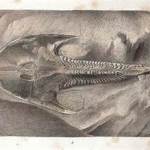 Louis Agassiz’ work The Structure of Animal Life clearly commits to the Creator-creature assumption of Hebraic-Christian truth. Agassiz ascribes the study of animal life to “the power, wisdom, and goodness of God.” In his mind, “the creation must have an intelligent being as its Author” dependant upon “the working of Providence in the world” pointing to an “intelligent Creator” who made the laws of nature. Agassiz studied Charles Darwin’s theory of natural selection for two years, thereafter actively opposing it based on his own work in paleontology.
Louis Agassiz’ work The Structure of Animal Life clearly commits to the Creator-creature assumption of Hebraic-Christian truth. Agassiz ascribes the study of animal life to “the power, wisdom, and goodness of God.” In his mind, “the creation must have an intelligent being as its Author” dependant upon “the working of Providence in the world” pointing to an “intelligent Creator” who made the laws of nature. Agassiz studied Charles Darwin’s theory of natural selection for two years, thereafter actively opposing it based on his own work in paleontology.
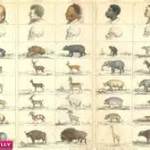 Well known for his opposition to the theory of natural selection Agassiz tried to explain Genesis 1-2 through “multiple creations” straining the credulity of the biblical account. Instead of all humans coming from one source—the literal/historical Adam and Eve—Agassiz supported “polygenism” (many origins) as an explanation of ethnic diversity. The explanation supposed that species and people groups do not change. Two centuries later, charges of racism follow scientists from the period (including Darwin). Agassiz had wrongheaded views of Genesis including the nefarious belief that only white people were the progeny of Adam and Eve.
Well known for his opposition to the theory of natural selection Agassiz tried to explain Genesis 1-2 through “multiple creations” straining the credulity of the biblical account. Instead of all humans coming from one source—the literal/historical Adam and Eve—Agassiz supported “polygenism” (many origins) as an explanation of ethnic diversity. The explanation supposed that species and people groups do not change. Two centuries later, charges of racism follow scientists from the period (including Darwin). Agassiz had wrongheaded views of Genesis including the nefarious belief that only white people were the progeny of Adam and Eve.
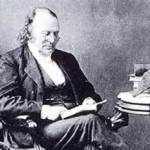 Like many innovators, Agassiz set standards for future study while also being remembered for disparaged theories and wrongful sentiments. But all should be reminded that Agassiz lived the observational truth of Psalm 111.2 “Great are the works of the Lord, studied by all who delight in them.” Jean Louis Rodolphe Agassiz (1807-73)
Like many innovators, Agassiz set standards for future study while also being remembered for disparaged theories and wrongful sentiments. But all should be reminded that Agassiz lived the observational truth of Psalm 111.2 “Great are the works of the Lord, studied by all who delight in them.” Jean Louis Rodolphe Agassiz (1807-73)
Picture credits: https://www.saiten.ch/agassiz-schwarz-weiss-und-bunt/; https://www.geolsoc.org.uk; https://www.lindahall.org/; https://philosophy.lander.edu/intro/introbook2.1/x426.html;
Louis Agassiz. 1874. The Structure of Animal Life. 3rd ed. (New York: Scribners).

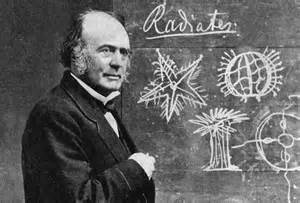
Thanks. Interesting.
In working with high school kids, this issue always comes up for discussion. I taught in an evolution class at the University of Illinois. I was the “fundamentalist Bible believer” presenter. Every year, the students assumed that it was simply impossible for any “real” scientist to believe in creation or the Bible. I would recommend Newton whose life choices always surprised them. The prof, a PhD in micro biology, always needed to verify I was telling the truth about Newton and others. I wish I’d have known about Agassiz. Fun. Thanks.
A scientist I’ve heard very little about. Thank you for writing this article, Dr. Eckel. It is informative and well-balanced, not shying away from the man’s faults but also praising him for his positive qualities and beliefs.
There have always been theistic scientists out there. The idea that there haven’t been is a lie–and I’ve no doubt that such a lie does not come purely from ignorance alone, but is propagated on purpose with full, conscious awareness by many.
After all, scientists are sinful human beings who want to stay in power too. 😉